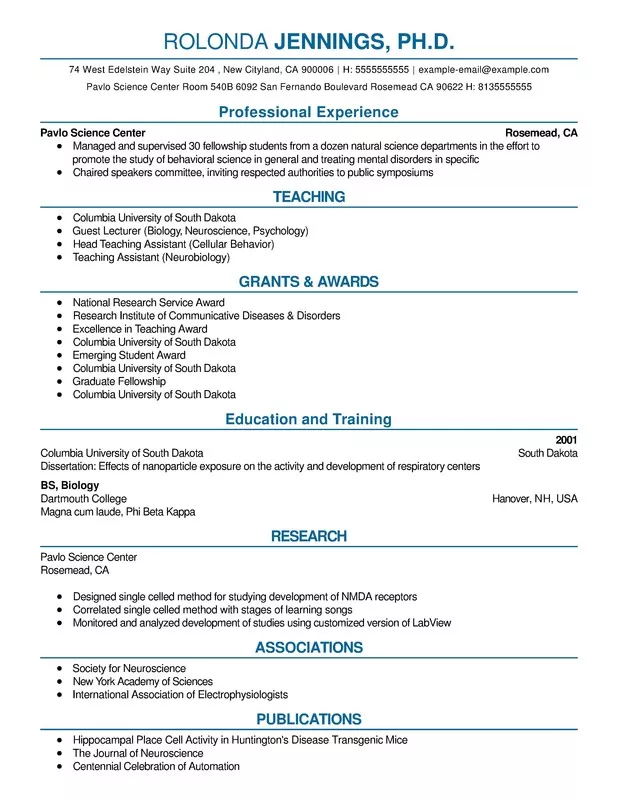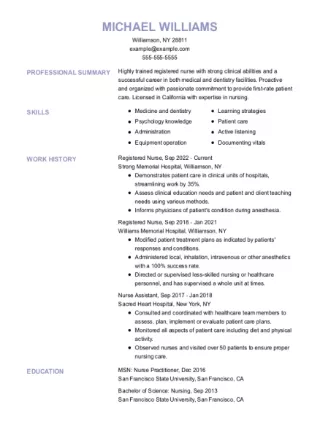Write a Powerful Resume Objective: Examples and Tips
A resume objective is a 2-3 sentence introduction to your professional experience and career goals. Follow our samples and examples to write yours.
Our customers have been hired by*:*Foot Note

What is an objective for a resume?
A resume objective is a two- to three-sentence summary located at the top of your resume. It provides a bite-sized introduction to your top skills and experience but unlike the resume summary, your resume objective statement also includes your goals and what you’re seeking to accomplish with your resume.
When do you use a resume objective?
It’s best to use a resume objective if you:
- Have less than two years of experience or no experience
- Recently graduated from college or high school and are looking for your first job or internship
- Want a career change
- Plan to relocate to another state and are seeking employment
Take a look at this example of an objective for a resume and note how it also states the job seeker’s desire for employment:
Caring and friendly high school graduate with babysitting experience seeking part-time job opportunities in day care. Experienced in caring for children ages 4-9. Fun, patient, adaptable and comfortable with small groups.
Build my resumeResume Objective Statement Format
Here are the four elements you need to keep in mind when you’re creating your resume objective.
1. Job title
The first thing you need to state is the job title you want to hold or currently hold. This should typically be the same as the specific position you’re applying for, e.g., “Marketing Manager” or “Sales Associate”.
2. Stated objective
Next, indicate your objective. Of course, your ultimate objective is to convince the company to hire you for the position you’re applying for. However, to create an appealing resume objective, you need to make this objective narrow enough to apply to the job listing but broad enough for it to encompass general goals. For example, someone who’s just gotten out of film school may state, “Film editor looking for an entry-level position to build experience in the film industry.”
3. Experience
If you do have experience, your resume objective should state this experience. This can even be true if your experience isn’t technically in the field you’re applying for. “Five years of experience in management” can still hold some weight in other fields, after all. Your best option is to determine how you can weave your professional experience with the field you’re pursuing, then write it down that way.
4. Skills and keywords
Lastly, you’ll want to add relevant skills — both hard skills and soft skills. Here are just a few of the skills that may be effective in a resume objective:
- Communication skills
- Interpersonal communication
- Computer skills
- Management skills
- Organizational skills
- Data entry
- SEO
- Team player
Some keywords you might want to emphasize include:
- Hard working
- Leader
- Adept
- Diligent
- Knowledgeable
These types of strong words will vary by industry, so make sure you look at resume samples from your field to see what types of words people are using. Make sure you use ResumeHelp’s advice on hard skills and soft skills for the best results.
How to make the most of your resume objective
Your resume objective should be straightforward and feature your best, most relevant skills. There’s no need for long explanations as to why you’re applying. Remember, recruiters and hiring managers typically spend less than a minute reviewing a resume. You should also tailor your resume objective to the specific job you’re interested in getting. By including keywords from the job description, you’ll create an ATS-friendly resume that can pass through the company’s filters and reach the right hands. This means evaluating the skills and requirements listed in the job posting and seeing which ones apply to you.Resume objective vs. resume summary
We mentioned the resume summary statement earlier in this article but let’s properly explain the difference between the two.
A resume objective and a resume summary serve more or less the same function. They’re both two to three sentences long and feature your top skill set and relevant experience. However, a resume objective also clearly states your professional goals.
A resume summary is ideal for candidates with three or more years of experience who are not changing careers. Whereas a resume objective is better for job seekers with little to no experience, changing professions or relocating.
If you’re uncertain, here’s a resume objective example next to a resume summary sample:
Resume objective example:
Creative marketing student seeking copywriting internship opportunities at advertising agency. Strong writing skills, knowledge of social media trends and ability to work well with others. Great time management skills and able to work independently.
Resume summary example:
Creative copywriter with five years of experience in advertising environments. Skilled in digital and traditional marketing, content creation and brainstorming with other creatives. Able to work under pressure and deliver unique ideas within tight deadlines.
Build my resume24 Featured resume objective examples
Use these resume objectives examples as a foundation for writing your own. We also have a wide range of resume examples for different professions and industries you can check out.
Teacher resume objective
Marketing resume objective
Customer service resume objective
Graphic designer resume objective
Internship resume objective
Project manager resume objective
Software engineer resume objective
Administrative assistant resume objective
Data analyst resume objective
Nursing resume objective
Business analyst resume objective
Mechanical engineering resume objective
Sales associate resume objective
Web developer resume objective
Computer science resume objective
Dental assistant resume objective
Education resume objective
Artist resume objective
Financial analyst resume objective
No experience resume objective
Sales resume objective
Writer resume objective
Engineering resume objective
Accounting resume objective
FAQ: Resume Objectives
Have questions? We’re here to help.
Where does a resume objective fit in a resume format?
Your resume objective will always be at the top of your resume. You want your objective to be the first thing a hiring manager sees, so they’re prepared for the rest of your resume. Think of it as your response to the job description; you’re explaining exactly why you fit the description.
What are the benefits of having a resume objective?
A resume objective highlights how you can benefit a company and that your career goals align well with the company’s needs.
It’s a good idea to look at resume examples for your industry and see how many of them include a resume objective or resume summary. If you notice that many of the resume examples for your job or industry opt for a summary instead of a resume objective, you should consider doing the same.
What’s a good objective for a resume?
A good resume objective accomplishes two objectives (so to speak): It informs hiring managers about your top skills and qualifications, and it also gives them an idea of the type of career and job you’re aiming for. A good objective should be written to satisfy the requirements of the job you want, so look over the job description and try to match your own experiences and strengths with what the job is looking for. Include some details about the type of work you’re seeking (i.e., “Programmer looking for opportunity that focuses on virtual and mixed-reality apps”).
What should I avoid in a resume objective?
The main thing to avoid in a resume objective is being over-wordy. Your resume should be quick, to the point and effective, and so should your objective. Think of it as an “elevator pitch.” If your resume objective is more than a few lines long, step back and see where you can trim it down.
It’s also common for job seekers to forget that their resume objective is supposed to showcase how they fit a job rather than why they’re interested in the job. You need to focus on skills and/or experience that are perfect for what the company is looking for. The intention of your resume objective is to make the company as interested in you as you’re interested in the company.
Couldn't find the answer you're looking for?





